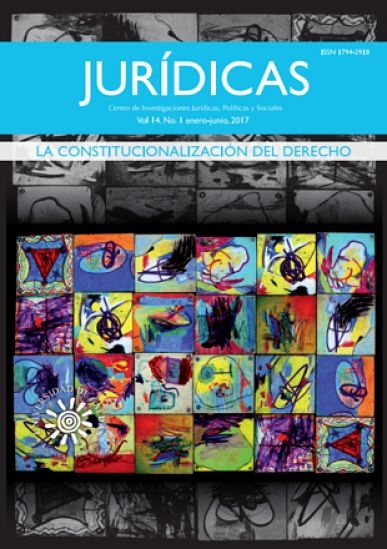Authors
Abstract
It is through the Aristotelian ethics, and its foundation in virtue, from where it is intended to lay the philosophical basis for thinking that there could be some virtues that should be incorporated in the basic training of lawyers and specifically the conciliator lawyer. This article selected both, ethical and intellectual virtues, which must be introduced into the curricula of the programs of law for the ethical training of these professionals. The virtues that were selected are: (i) Justice, since it is willing to practice what is right; (ii) the prudence, by which the lawyer conciliator is able to deliberate properly about what is good and (iii) wisdom, intellect and science; intellect because it refers to the principles and science because it refers to things susceptible of demonstration from principles.
Keywords:
References
Aristóteles. (1998). Metafísica. Madrid, España: Editorial Gredos.
Aristóteles. (2010). Ética nicomáquea. Madrid, España: Editorial Gredos.
Aristóteles. (2010). Retórica. Ciudad de México, México: UNAM.
Aristóteles. (2011). Ética eudemia. Madrid, España: Editorial Gredos.
Aristóteles. (2011). Magna moralia. Madrid, España: Editorial Gredos.
Aristóteles. (2011). Política. Madrid, España: Editorial Gredos.
Calvo, T. (2010). Introducción. En Aristóteles. Acerca del alma. Madrid, España: Biblioteca Básica Gredos.
Contreras, S. (2012). La justicia en Aristóteles. Una revisión de las ideas fundamentales de Ethica Nicomachea. Ágora: Estudos Clássicos em Debate, 14, 63-80.
Forero, C. (2009). Lo justo distributivo: consideraciones sobre un caso en concreto. Revista Dikaion, 16, 185-195.
Garcés, L.F. (2014). Bioética para la experimentación con animales a partir de la ética de Aristóteles. Una reflexión filosófica para el cuidado de lo otro (tesis posgrado). Doctorado en Filosofía, Universidad Pontificia Bolivariana, Medellín, Colombia.
Karmy, R. (2006). Sobre la decisión en la prudencia de Aristóteles. Una introducción al problema de lo animal y lo humano. A parte Rei, 46, 1-16.
Marcos, A. (2011). Aprender haciendo: paideia y phronesis en Aristóteles. Educacao, 34 (1), 13-24.
Marcos, A. (2011). Aristóteles y los delfines. Acerca de los objetivos de la biología aristotélica. Recuperado de http://ebookbrowse.com/a-marcos-aristoteles-y-los-delfines-doc-d213211964.
Tierno, P. (2009). La concepción de la justicia política en Aristóteles. 9° Congreso Nacional de Ciencia Política: Centros y Periferia. Universidad de Buenos Aires, Buenos Aires, Argentina.
Vidal, J.M. (2006). Las virtudes en la medicina clínica. Archivos en Medicina Familiar, 8 (1), 41-52.

 PDF (Español)
PDF (Español)
 FLIP
FLIP





















